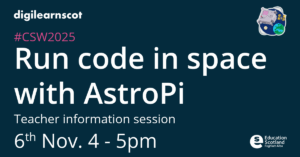
Join this one-hour online training session and learn how to take part in the European Astro Pi Challenge. Astro Pi is an ESA and national ESEROs project run in collaboration with the Raspberry Pi Foundation that lets young people send Python code to run on the International Space Station (ISS).
Designed for teachers, educators, and Code Club leaders, this session introduces everything you need to facilitate the Astro Pi “Missions” with your students.
Astro Pi Mission Control will introduce you to our two “Missions”, tool and tips for running them, so you can choose which one will suit your students best:
Mission Zero: Write a simple program to take a reading from the colour and luminosity sensor on an Astro Pi computer on board the International Space Station, and use it to set the background colour in a personalised image for the astronauts to see as they go about their daily tasks. Suitable for beginners with Python.
Mission Space Lab: Teams must write a program in Python that captures data from the Astro Pi computers’ sensors or camera about the orientation and motion of the ISS as it orbits the Earth. Then the program must use this data to calculate the speed of the ISS in kilometres per second (km/s).
Participants for both missions receive certificates with the exact time and date their programs ran in space. Mission Space Lab teams will also receive data captured by programs.
At this session you’ll learn:
🚀 How to run Mission Zero with your students using using our browser-based coding environment
🧩 How to run Mission Space Lab, including using the online testing tool ‘Astro Pi Replay’
🎓 Where to find tips for running engaging sessions and trouble shooting
By the end of the workshop, you’ll be equipped to bring space to your classroom and join a Europe-wide network of teachers inspiring the next generation of digital explorers.

